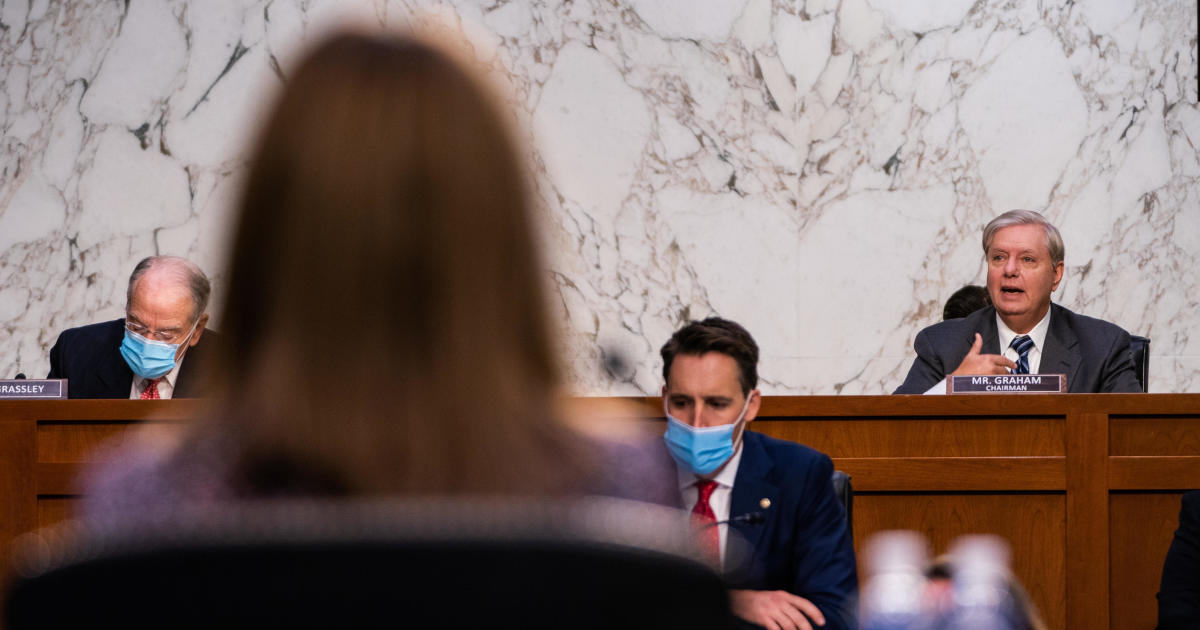Washington — The Senate Judiciary Committee concluded its fourth and final day of hearings for the Supreme Court nomination of Judge Amy Coney Barrett on Thursday, with President Trump’s pick to fill the open seat on the high court clearing the first barrier to confirmation with few hiccups ahead of a committee vote slated for next week.
Republicans have the votes to send her confirmation to the full floor for a vote, but committee Chairman Lindsey Graham announced her nomination would be held over for one week, as is customary under committee rules.
After a vote by the Republican-led panel, the Judiciary Committee officially scheduled a vote to approve Barrett’s nomination for October 22 at 1 p.m., after which it will be sent to the Senate floor.
Democrats on the panel made motions to adjourn the proceedings — though it was withdrawn — and indefinitely delay Barrett’s nomination. They argued that it was inappropriate to rush through Barrett’s nomination so close to the November 3 election. The motion to delay Barrett’s nomination was voted down by the Republican-led panel.
“This is a sham,” Democratic Senator Amy Klobuchar said. “We should allow the winner of the election to pick this nominee.”
Democratic Senator Dick Durbin argued that there had been “a denigration of the process to the point where it’s almost useless,” noting that Barrett had refused to answer several questions which would seem to have simple answers. She declined to say whether the president could unilaterally delay an election or prevent someone from voting, both of which are unconstitutional, or whether she believed climate change existed. Barrett did not answer because she said that she did not want to become involved in political matters.
“I would be afraid to ask her about the presence of gravity on Earth. She may decline to answer because it may come up in a case,” Durbin said.
The October 22 vote by the Judiciary Committee tees up a vote by the full Senate the week before the election. With Republicans’ three-seat majority, her confirmation is all but assured — a fate that was acknowledged by Democrats as they made a last-ditch, and unsuccessful, appeal to their Republican colleagues not to proceed with Barrett’s nomination.
“This goose is pretty much cooked,” Senator Cory Booker, a Democrat from New Jersey said. However, Ranking Member Dianne Feinstein at the end of Thursday’s panel thanked Chairman Lindsey Graham for holding hearings where both parties were given equal time and treated with respect.
“This is one of the best set of hearings that I have participated in,” Feinstein told Graham. Graham in turn thanked Democrats for asking respectful yet challenging questions of Barrett.
“I accept those challenges as being sincere and not personal,” Graham said about Democrats’ questions of Barrett.
The last day of Barrett’s confirmation hearings also featured testimony from two representatives from the American Bar Association, which rated Barrett as “well qualified” this week.
The first witness, Randall Noel, talked about the nonpartisan, impartial review that the ABA undertakes to grade a nominee. He said the ABA interviewed Barrett for over three and a half hours.
“Our rating of ‘well-qualified’ reflects the consensus of her peers that know her best,” Noel said.
Pamela Roberts, the lead evaluator for the ABA’s Standing Committee on the Federal Judiciary Committee’s evaluation of Barrett, said the panel received many “laudatory” comments and spent thousands of hours on the evaluation.
“Judge Barrett has earned and enjoyed a reputation for integrity and outstanding character,” Roberts said. “Judges and lawyers alike uniformly extolled the nominee’s integrity.”
Eight witnesses, four chosen by Democrats and four chosen by Republicans, also weighed in on her nomination for lawmakers. Barrett did not attend Thursday’s proceedings.
One notable witness was Judge Thomas Griffith of the U.S. Court of Appeals for the District of Columbia Circuit. He was appointed by George W. Bush, and among the Democrats who supported his nomination were then-Senators Barack Obama and Joe Biden. Griffith officially retired in September and his seat was filled by Judge Justin Walker.
Griffith called Barrett “supremely qualified” and said he agreed with Chief Justice John Roberts’ statement in November 2018 rejecting the notion there are Obama judges or Trump judges.
“The rule of law is a fragile possibility that should be more carefully safeguard by our leaders,” he said.
Some witnesses discussed the ways they have benefited from the Affordable Care Act; another, Crystal Good, talked about her experience having to seek a judicial bypass to have an abortion when she was 16.
During her own testimony on Tuesday and Wednesday, Barrett refused to give her opinion on contested legal issues that may come before the Supreme Court, including health care, abortion, and other areas — an approach taken by other Supreme Court nominees before her.
Democrats pushed Barrett on how closely her jurisprudence would follow that of her mentor, the late Justice Antonin Scalia, since Barrett has said they shared the same judicial philosophy. She reiterated that while both believed in the theory of originalism — interpreting the Constitution based on the Founders’ intentions — she would not necessarily decide cases in the same manner.
“I assure you I have my own mind. Everything that he said is not necessarily what I would agree with or what I would do if I was Justice Barrett,” Barrett said of Scalia.
